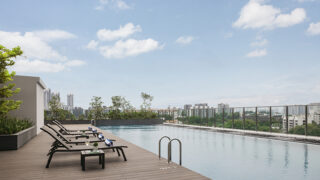If you’re getting to a point where you think you, or both of you, need to talk to someone about your issues, clinical psychologist Claudia Doig is available for online counselling sessions and couple therapy sessions.
In this article she looks at what it takes to keep the love alive in a marriage or long-term relationship. She tells us about the “lovebows” we need in order to make a marriage ‘better’.
Don’t we feel wistful when we see that rare old couple holding hands, looking so peaceful and content? While we may think they are just lucky, the secrets of deep connectedness and lasting love were heavily researched by American psychologist Dr John Gottman. He observed over 3,000 couples across decades, identifying the behaviours and attitudes that benefit or damage marriages. His findings indicate that we can all cultivate our own “lovebows” – special ties that keep couples in strong, loving relationships.
Why it’s important to make it work
But why bother, when it takes so much effort and hard work? Well, myriad studies indicate that happy marriages pave the way for increased health, higher immunity, higher recovery rates from illness and longer lifespans. For example, unhappily married men are 11 times more likely to die prematurely than happily married men.
The benefits of a good marriage further extend to our children. Gottman found that the higher the quality of a marriage, the fewer stress hormones in children. Quality of marriage not only directly impacts children; it indirectly impacts parenting quality and children’s future trajectories. The better the quality of our marriage, the better the outcomes for our kids! And, lastly, why not have a home that’s a safe place, where we feel happy and appreciated?
The significance of small acts
This may sound intuitive, but the energy source of lovebows is trust – in a much larger sense than jealousy alone. To measure trust, Gottman used what is known as game theory, likening personal benefits to game theory “payoffs”. Consider washing dishes, for example. To maximise one’s own payoffs, one would want to persuade their partner to wash the dishes. To maximise the relationship’s payoffs though, one would perhaps want to alternate washing dishes.
While washing dishes may seem trivial, seemingly small acts can combine to carry enormous significance over time. In this context, trust is the couple’s stance whereby each partner is ready to change their own behaviour to benefit their partner – and, implicitly, the relationship. When trust is lacking, a partner’s position shifts. They maximise their own benefits at the expense of the other person’s, and therefore at the expense of the relationship. When two partners seek to maximise their own payoffs, they move towards opposite sides of a camp, gradually becoming adversaries. Couples who nurture their lovebows act purposefully to prevent such an adversarial stance from developing in their relationship.
To fuel our lovebow, we want to be in a trusting relationship where we maximise each other’s benefits. We want to trust that our partner has our back, and our best interest at heart. We are happy when our partner succeeds and unhappy when they’re upset – our happiness is interconnected. Both partners are willing to sacrifice for the marriage by sometimes prioritising the needs of the partner, since maintaining the partnership is the ultimate outcome.
Betrayal, trust and connectedness
On the other hand, when trust dissipates, we start feeling betrayed at an intuitive level – this is when we typically say that our partner is “changing”. To keep peace, we avoid expressing our needs, and our partner appears to be emotionally unavailable. Betrayal can have many shapes and colours. For instance, flirtatious behaviour towards others indicates superficial commitment; it communicates to the partner that all is good unless they come across someone better. Other forms of betrayal are lying, emotional affairs, not being there at crucial times (in illness, for example), being absent, being unavailable emotionally or sexually, breaking promises, and treating the partner with disrespect, selfishness or unfairness.
While trust keeps the lovebow bright, love is further nurtured through deep connectedness. Happy loving couples achieve this intimacy through treating each other with appreciation and kindness; they maintain a healthy ratio of positive to negative comments that is much higher compared to unhappy couples. These partners tend to express their appreciation for each other more often than they share their discontent. Loving partners embrace the opportunity to talk, by being responsive and genuinely interested in the topics brought up by each other. Loving partners tend to accept each other’s guidance and listen with patience to each other’s points of view. In couple therapy, these lovebow skills can be nurtured and practiced.
More secrets of loving couples
Another noteworthy secret of loving couples is that when they have a fight, they don’t brush it under the carpet. Once tempers have cooled, they discuss the incident and they engage in repairing behaviours, such as apologising or committing to handling such matters in better ways in the future. They intuitively avoid falling into the trap of piling unresolved issues between them. This way, they bypass the Zeigarnik effect, according to which, couples are twice as likely to recall unresolved matters than processed ones.
An additional secret of loving couples is that they protect their relationship from the outside world. They work as a team with the attitude that their couple is a bubble in which they roll together. They keep each other informed of what’s going on when not together, and they share their stressors, challenges and worries. And they don’t use these opportunities to put each other down; rather, they maintain the bubble rolling gently, “us above the world”. These loving partners don’t talk poorly of each other in front of others, and they don’t compare their partners with others in negative ways.
A final word
The rule of reciprocity acts at a very deep level in these loving couples. The more they give, the more they receive from their partner. This beautiful “dance” creates treasure chests of happy memories and enduring faith that the partners will be there for each other time after time. When hard times knock at their door, these treasure chests buffer loving couples from adversity, allowing them to overcome challenges; they understand and accept that there are no perfect others, and thus spend their time feeling lucky for having a loving partner and protecting their relationships from the outside world.
During this current challenging time, many of us will spend significantly more time together and have the opportunity to reflect and work on our marriages. If you would like to use this time to improve your lovebow, I’m available for online or face-to-face counselling sessions.
Find out more at claudiadoig.com, or contact Claudia through Annabelle Psychology, #17-12 Novena Medical Suites, 101 Irrawaddy Road.
8202 3385 | claudia@apsy.sg | annabellepsychology.com
To read more about life and love, head to our Living in Singapore section.
Don't miss out on the latest events, news and
competitions by signing up to our newsletter!
By signing up, you'll receive our weekly newsletter and offers which you can update or unsubscribe to anytime.




